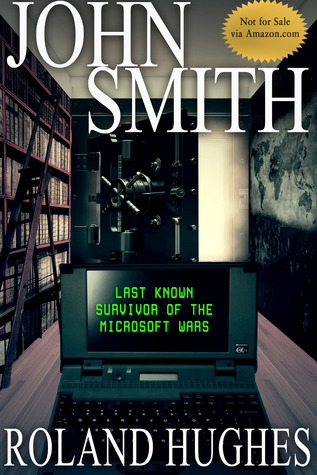Title: John Smith: Last Known Survivor of the Microsoft Wars
Author: Roland Hughes
Publisher: Logikal Solutions
ISBN: 9781939732002
Pages: 274, Paperback/Kindle
Genre: Fiction
Reviewed by: Darcie Martin, Pacific Book Review
Book Review
John Smith is the last known survivor of the Microsoft Wars, which are not directly related to the Microsoft company we all know today. This book really makes you think about the future, but also makes you re-examine what we know of the past, for example, is Atlantis really a myth, or is it simply spoken history that has been distorted by time.The story begins with a young reporter interviewing a man who lives in the bunker, which allowed him to survive the Microsoft Wars. One of the first things said to this young woman is that she has no frame of reference to ask any questions of the Microsoft Wars. This leads into a discussion of many things including nuclear power and subsequently, warfare. Religion is explained to Susan Krowley, the reporter, as well as many other things that no longer exist. She experiences a computer and telescope, first hand and becomes intrigued at the International Space Station.
Roland Hughes spins a very diverse tale, which makes you think about the world around you in a new way. You will find yourself questioning just how many times humans have began what he calls a cycle. Our history shows proof of things like aqueducts in history, and then they vanished only to be re-invented decades later. Hughes suggests that this is more common than we realize, the point is driven home by many small things that we no longer know who created. Hughes points out many times how history is lost through the character of John Smith. Smith has spent most of his life in a bunker surrounded by knowledge, which is practically useless. The technology to read many of the devices is gone and the books are slowly being destroyed by time. Other factors can destroy said books much faster, such as a fire. Stone is portrayed as the best way to retain knowledge, but even then, it can be rendered useless as it has been in the Pyramids in Egypt due to the languages used being erased from the Earth.
This is a publication that makes you think, it is a very enjoyable read for those that enjoy science fiction and tales of things that may just be true. As I began the book I thought I would find the interview style annoying to read, but I was sucked in within a few pages. There are points in the story that are slow to progress while John Smith repeats a history lesson, but this is needed for those that may not know it. My favorite part of the book is one of the last statements in which John Smith once again points out the difference between a reporter and journalist by telling Susan Krowley “A journalist would have asked who my grandfather was, where he came from and why he was so proud of his bloodline”. It is one line that tells you the story is just a myth, however as John Smith says many times “Myth that became legend that became reality.” just because it is a myth now does not mean it will never be reality.


